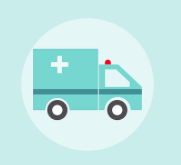Managing Chaos: Why Every College Student and New PR Grad Should Work in an Emergency Room

Recent college grads and current students seeking to develop a wide variety of skills often think they have to apply to Fortune 100 companies to gain credible experience. Yet, most often overlook amazing small companies, organizations and institutions right in their backyard.
Contrary to the career tracks of most PR & Communications professionals, my career began in local hospital administration. I was responsible for maintaining unit communications and interacting with the public.
When I received the hospital’s offer letter via email, I jumped for joy until I read the fine print, “reporting into the Emergency Room.” I was on vacation for the weekend in Maryland and immediately called my mother because I felt so unprepared.
She, too, was shocked by the offer as I had applied and interviewed the year before. I had since applied to over 100 internships yet had only been invited to attend two scheduled interviews at leading companies.
That day, the advice my mother gave me was simple, short and sweet:
“Dig deep, and understand that it is important to feel a little uncomfortable at times within your career — especially in the beginning — because that means you’re learning, growing, and pushing yourself.”
It was a lot to take in but the team had an immediate opening beginning that Monday. At that very moment, I ended my vacation, accepted the offer, jumped into my car and took the seven-hour drive back to New York City.
Navigating Shock
I had high hopes to learn everything there was to know about emergency rooms in a 24-hour period.
Google wasn’t even a thing yet so much of the information I found was on AskJeeves.com (yes, there was a time when Google wasn’t used as a verb).
Nothing could have prepared me for what was in store that Monday. The constant beeping gave me a headache, the high pressure and intensity was profound and I was insanely stressed by the continuous overhead announcements of various medical codes.
In a single eight-hour shift as an ER unit clerk, I would have to decipher medical codes and emergencies, translate foreign languages, understand doctor-speak (without access to WebMD), all the while juggling issues for more than two dozen patients.
And that was on a slow day. Thus, our nurses, medical professionals and teams weren’t playing cards; they were on the frontlines.
Coming To My Senses
The skill of managing the matrix of patients, items and communications flow within in a single Emergency Department was intense. And the level and speed at which such communications and decisions must occur simultaneously, with accuracy and precision, was sometimes befuddling.
Yet one day, six months later, I was struck by the realization that I knew and understood all of the information, medical diagnoses and plans for all of the patients listed on the ER tracker board.
It was a proud moment because I realized I had become an experienced crisis professional simply by conquering a few fears.
The Issues With Career Mapping Today
Had I not worked in the Emergency Department, filled with loud noises, high pressure and intensity, I may not have thrived in a broadcast newsroom environment later down the road. And, had I not been able to decipher tough medical lingo, codes and matrixed messages, I may not have later succeeded in an IPO environment, where financial discussions, terms and complexity became the norm.
Overall, college majors, current job titles, nor interests will dictate your path to growth; finding the right environment for you to develop and hone your special talents will.
Five Emergency Room Skills You Can Master to Advance Your Career
1) Becoming Assertive
Emergency department skills encompass far more than administering patients quickly. Since you’ll be in command, you’ll learn when and how to speak up, voice concerns and ideas. And, you’ll master how to manage up with senior leadership and take orders in a crisis.
2) Remaining Calm and Developing Grit
Working in an ER setting is tough and sometimes grueling, as you are meeting people in terrible situations and every shift has the potential to be taxing but it will teach you how to manage difficult issues, develop ways to process the hard stuff and remain calm. Grit is a bi-product.
3) Becoming a Mentor and Mentee
You’ll find mentors and mentees where you’d least expect – in patients, visiting families and/or professionals of other disciplines. Mentorship will take place within a series of real-life chaotic moments, versus within a controlled environment. It can even serve as inspiration.
4) Managing Chaos in a Stressful Environment
Chaos is abounding in ER environments and in business, the very root of our work routines is to bring efficiency to that chaos. Better defining what triggers stress and creating a plan of action to outperform it will serve you later in life.
5) Mastering the Art of Conflict Resolution
Life and careers are filled with conflict, much of which will seemingly get in our way. In the ER, conflict is a natural occurrence. Fast-paced, learning environments, like an ER, allow you to listen with curiosity, ask questions and prove your chops at mediation. After mastering, you’ll have a competitive edge on solving problems and restoring order.
–
Kristen Clonan is a public relations, digital and corporate social responsibility professional, currently working for Hudson Group, one of North America’s largest travel retailers. As a current mentor to young professionals, she currently writes about her professional experiences in various outlets.
